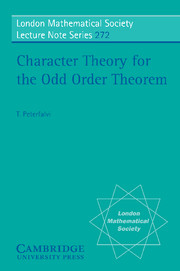Book contents
- Frontmatter
- Cotents
- Preface
- Part I Character Theory for the Odd Order Theorem
- Introduction
- Notation
- 1 Preliminary Results from Character Theory
- 2 The Dade Isometry
- 3 TI-Subsets with Cyclic Normalizers
- 4 The Dade Isometry for a Certain Type of Subgroup
- 5 Coherence
- 6 Some Coherence Theorems
- 7 Non-existence of a Certain Type of Group of Odd Order
- 8 Structure of a Minimal Simple Group of Odd Order
- 9 On the Maximal Subgroups of G of Types II, III and IV
- 10 Maximal Subgroups of Types III, IV and V
- 11 Maximal Subgroups of Types III and IV
- 12 Maximal Subgroups of Type I
- 13 The Subgroups S and T
- 14 Non-existence of G
- Notes
- References
- Part II A Theorem of Suzuki
- Appendix I A Special Case of a Theorem of Huppert
- Appendix II On Near-Fields
- Appendix III On Suzuki 2-Groups
- Appendix IV The Feit-Sibley Theorem
- References
- Index to Parts I and II
Introduction
Published online by Cambridge University Press: 05 September 2013
- Frontmatter
- Cotents
- Preface
- Part I Character Theory for the Odd Order Theorem
- Introduction
- Notation
- 1 Preliminary Results from Character Theory
- 2 The Dade Isometry
- 3 TI-Subsets with Cyclic Normalizers
- 4 The Dade Isometry for a Certain Type of Subgroup
- 5 Coherence
- 6 Some Coherence Theorems
- 7 Non-existence of a Certain Type of Group of Odd Order
- 8 Structure of a Minimal Simple Group of Odd Order
- 9 On the Maximal Subgroups of G of Types II, III and IV
- 10 Maximal Subgroups of Types III, IV and V
- 11 Maximal Subgroups of Types III and IV
- 12 Maximal Subgroups of Type I
- 13 The Subgroups S and T
- 14 Non-existence of G
- Notes
- References
- Part II A Theorem of Suzuki
- Appendix I A Special Case of a Theorem of Huppert
- Appendix II On Near-Fields
- Appendix III On Suzuki 2-Groups
- Appendix IV The Feit-Sibley Theorem
- References
- Index to Parts I and II
Summary
The Feit-Thompson Theorem states that every finite group of odd order is solvable. This statement is clearly equivalent to the following: there is no non-abelian simple group of odd order. The theorem, first conjectured by Burnside, was proved in 1963 by W. Feit and J.G. Thompson in [FT]. Two papers, which prove the theorem in special cases, preceded the appearance of [FT]. In [Su], M. Suzuki proved the theorem for CA-groups of odd order: a group G is a CA-group if, for every element x ≠ 1 of G, CG (x) is abelian. In [FHT], the theorem was shown for the CN-groups of odd order: a group G is a CN-group if, for every element x ≠ 1 of G, CG(x) is nilpotent.
Each of these proofs is divided into two parts. In the first part, a minimal counterexample G to the theorem is considered and the structure of the maximal subgroups of G is studied. This part is very short in [Su], but is much more complicated in [FHT], and considerably more so in [FT]. In the second part, a contradiction is obtained by the use of character theory. The existence of isometries between virtual characters of maximal subgroups of G and virtual characters of G is one of the basic tools. In [FT], this second part leaves a residual case in which no contradiction arises. This case is eliminated in the final chapter of [FT], by explicit calculations with relations between elements of G.
- Type
- Chapter
- Information
- Character Theory for the Odd Order Theorem , pp. 1 - 2Publisher: Cambridge University PressPrint publication year: 2000

